2025.02.05. Cooperation workshop with Cultura säätiö. Our project team and Cultura Foundation had a creative brainstorming session to discuss possible future collaborations. During the workshop, we shared our expertise and findings in researching the Russian-speaking community, while Cultura Foundation presented ideas for possible future projects. It was agreed to further develop the ideas generated during the meeting and to look for opportunities for cooperation in the near future.
2024.09.11.-12. Vera Zvereva was invited to give a talk at the Roundtable on Digital memory at the conference “Memory Rights and Memory Wrongs” in Munich, Germany. This conference was organised by the research project “Memocracy” https://memocracy.eu/project-workshops/
Vera’s talk was entitled “Disjunctive Memory and Russian Digital Media in the 2020s”. The full programme of the conference is available here: https://memocracy.eu/static/16a0116722bf5c4b5ac6dbf2f9780f82/Memory-Rights-Memory-Wrongs_Full-Program.pdf
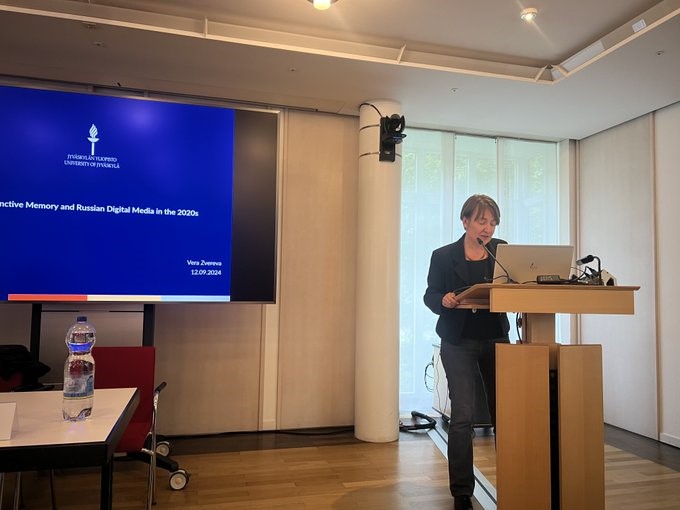
2024.08.22. A roundtable (Inter)national Cultural Policy and Warfare: Cultural heritage destruction and cultural mobilisation at the 13th ICCPR (International Conference on Cultural Policy Research) in Warsaw, Faculty of Political Science and International Studies, University of Warsaw, Poland
The roundtable aimed to explore the complex dynamics between cultural policies and wartime contexts, focusing on their perception/articulation at national and international levels e.g., through multilateral cultural heritage treaties and international cultural organisations. It also sought to explore the multifaceted role of cultural policies in shaping narratives, identities and public consciousness in times of conflict. At the same time, it paid particular attention to the issue of the destruction of cultural heritage during war. By examining both sides of this problem from different geopolitical contexts, it provided a comprehensive understanding of how cultural policies in democratic and non-democratic regimes contribute to, reflect or respond to the exigencies of war.
Panellists Dr. Tatiana Romashko (University of Jyväskylä), Dr. Miia Huttunen (University of Jyväskylä), Dr. Oleksandra Gaidai (National University “Kyiv-Mohyla Academy”), Dr. Elzbieta Olzacka (Jagiellonian University in Krakow) and Dr. Melissa Nisbett (King’s College London) considered cases of deliberate destruction of cultural heritage during wartime conflicts, both present and past. This was complemented by a discussion of the cases of cultural mobilisation in both democratic and non-democratic regimes. Specific attention was paid to delineating trends in terms of the policies pursued by state institutions, as well as the dimensions of grassroots, civic and dispersed activities. The panel contrasted cases of colonialist policies in occupied territories with cases of domestic patriotic mobilisation.
2024.06.06-07. A presentation on Russia’s Cultural Diplomacy in Finland after February 2022 by Tatiana Romashko at the “Past the Divide and Beyond: New Perspectives to Cultural Diplomacy in Cold War Europe” workshop organized by The Mission Finland – Cold War Cultural Diplomacy at the Crossroads of East and West project sponsored by the Research Council of Finland and the University of Turku, 6-7th June, Arcanum building, University of Turku, Finland
In her presentation Tatiana described Russia’s typical approaches to cultural diplomacy, highlighting the dynamics of its key strategies and target audiences employed after February 2022. She also discussed the mechanisms through which Russia strives to project its ‘positive’ Russian World imaginary to specific audiences in Finland in the absence of its official diplomatic mission. Finally, Tatiana discussed the contrast between the Kremlin’s soft power activities and the cultural activities offered by Finnish non-profit organisations in the Russian language. In doing so, she drew attention to the ‘agency’ of Finnish cultural organisations working with Russian-speaking populations, which is accelerated by the double pressure of being labelled as ‘Russian compatriots’ by the Kremlin and as ‘subjects of the Russian world’ by Russian speakers themselves.
2024.06.05. Tatiana Romashko (MA) defended her doctoral thesis in Cultural Policy “Development of Contemporary Russian Cultural Policy: From Liberal Decentralisation towards Conservative Hegemony” on Wednesday, 5 June 2024, at 12:00 in the hall S212 at the Seminarium Building, University of Jyväskylä. Senior Lecturer Dr Aliaksei Kazharski (Charles University) served as the opponent and Professor Mikko Jakonen (University of Jyväskylä) as the custos.
MA Tatiana Romashko’s dissertation examines the transformation of Russian cultural policy from democratic orientations to a distinctly authoritarian approach after 2012. The study explains how a shift towards traditionalism, essentialism and conservatism in cultural policy has been instrumental in consolidating Vladimir Putin’s grip on power.
2024.04.06. A presentation “Putin’s ‘Cultural Front’: Russian Art in the Service of War” by Tatiana Romashko, at at the Annual conference of the British Association for Slavonic and East European Studies, 5-7th April, Robinson College, Cambridge, United Kingdom.
Tatiana presented a paper that explores the emergence of the ‘cultural front of Russia’ and its impact on Russian and Ukrainian societies. This public movement was established in November 2022 as an urgent response to the needs of the Russian state in pursuing the goals of the so-called ‘special military operation’ in Ukraine. This initiative is interesting for two reasons. First, it aims to promote the mass mobilisation of Russians in support of the war by multiplying the Kremlin’s narratives through people’s everyday discursive practices. Second, it serves as an expert platform responsible for implementing presidential decrees on state cultural policy. This includes monitoring budget allocations and promoting cooperation between workers in various socio-cultural, educational and religious fields and the military. The context of Russia’s invasion and deliberate destruction of tangible and intangible cultural heritage in Ukraine lends urgency to the study of the Kremlin’s strategies of cultural colonialism within Russia and in the annexed regions of Ukraine. Tatiana’s paper addresses this complex issue at the intersection of cultural politics, patriotic consumption and everyday nationalism and seeks to answer the following research questions. What are the practical, legislative and civic characteristics of the ‘cultural front of Russia’? And how does it attempt to influence the cultural milieu in Russia and the annexed territories of Ukraine? She approaches the dynamics surrounding the construction of the ‘cultural front’ through an analysis of the recent cultural policy debates in the Russian State Duma and the rapid measures of policy enforcement after February 2022, including the promotion of the war campaign through art events and cultural production.
2024.04.05. A round table “Remnants of the ‘Russian World’ in Europe’s Online and Offline Spaces”, at at the Annual conference of the British Association for Slavonic and East European Studies, 5-7th April, Robinson College, Cambridge, United Kingdom.
The round table, chaired by Tatiana Romashko, had Vera Zvereva, Kapitolina Fedorova, Jade McGlynn, and Tatiana Golova as panelists.
Vera Zvereva discussed Russia’s efforts to expand its influence in European countries, not only through methods previously identified as cultural diplomacy or open media propaganda but also through the tools of information warfare. These methods involve implicit and covert influence, where the Russian side does not openly declare and even conceals its agency. Various proxies are employed, with a primary focus on frequent and discreet information campaigns at a level below that of formal institutions. The primary targets of such campaigns are often the “compatriots” or Russophones residing outside of Russia. Vera delved into how pro-Russian trolls seek to solidify their influence in online groups of Russophones in Finland by exploiting imperial sentiments among post-Soviet immigrants. Additionally, they aim to foster distrust towards Finnish authorities and sow discord within the Russophone community in Finland.
2024.03.21. A presentation by Rasa Žakevičiūtė and Tatiana Romashko “Bridging Cultures: The role of Russian-speaking organisations in promoting belonging in Finland”, at The Annual Sociological Conference 2024, 21-22 March, University of Eastern Finland, Kuopio.
In their presentation, Rasa and Tatiana discuss the key role of Russian-speaking socio-cultural organisations in Finland in mitigating psychological and social fragmentation. These organisations act as critical mediators, facilitating inter-community ties among Russian speakers and serving as a bridge to the wider Finnish society. We tentatively identify three primary mechanisms through which these organisations strengthen a sense of belonging: 1) guiding official integration processes, 2) facilitating psychological and social adaptation, and 3) cultivating a sense of purpose and connectedness. Together, these mechanisms aim to integrate Russian speakers into Finnish society, unlocking their potential and empowering them with local insights. The findings highlight the importance of collingual organisations in the integration landscape and point to practical implications. It suggests that policy approaches to integration and inclusive societies should focus on initiatives aimed at building trust between organisations, open networking and creating opportunities for belonging. Empowering immigrant communities through collingual public organisations not only strengthens individual identities but also weaves a more cohesive social fabric that resonates with the broader dynamics of belonging in an increasingly diverse world.
2024.02.23. A Workshop on on inter-project collaboration and ethical considerations, University of Jyväskylä. Finland.
A workshop was organized in collaboration with scholars from the recently launched project “Everyday Affective Practices Online: Producing, Experiencing, and Managing Hate Speech in the Digital Era”. It consisted of our team, Dr Evgenia Amey from the new Kone funded project as well as researchers focusing on Russian-speaking communities – Dr Ilkhom Khalimzoda, Dr Francesca Chiarvesio and Doctoral researcher Han Yue. A more detailed report of the meeting is available on our blog: Workshop on inter-project collaboration and ethical considerations
2023.12.22. An edited book by Olga Solovova and Sabina Vakser “Russian as a Transnational Language: Resonance, Remembrance, Renewal” is out now.
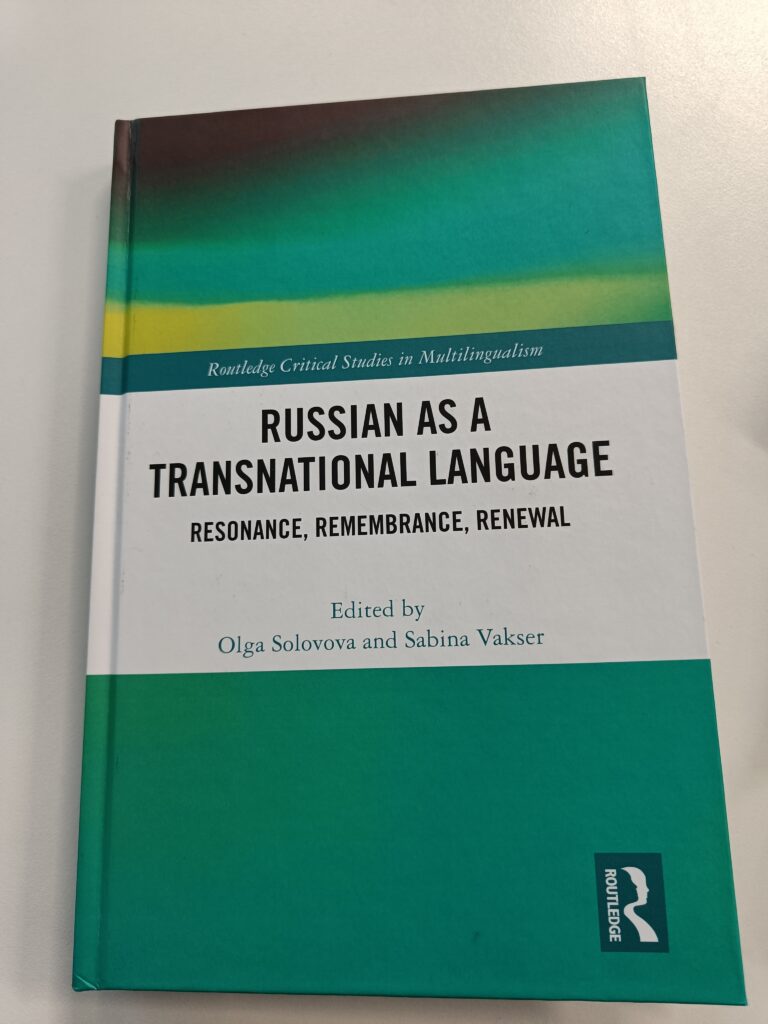
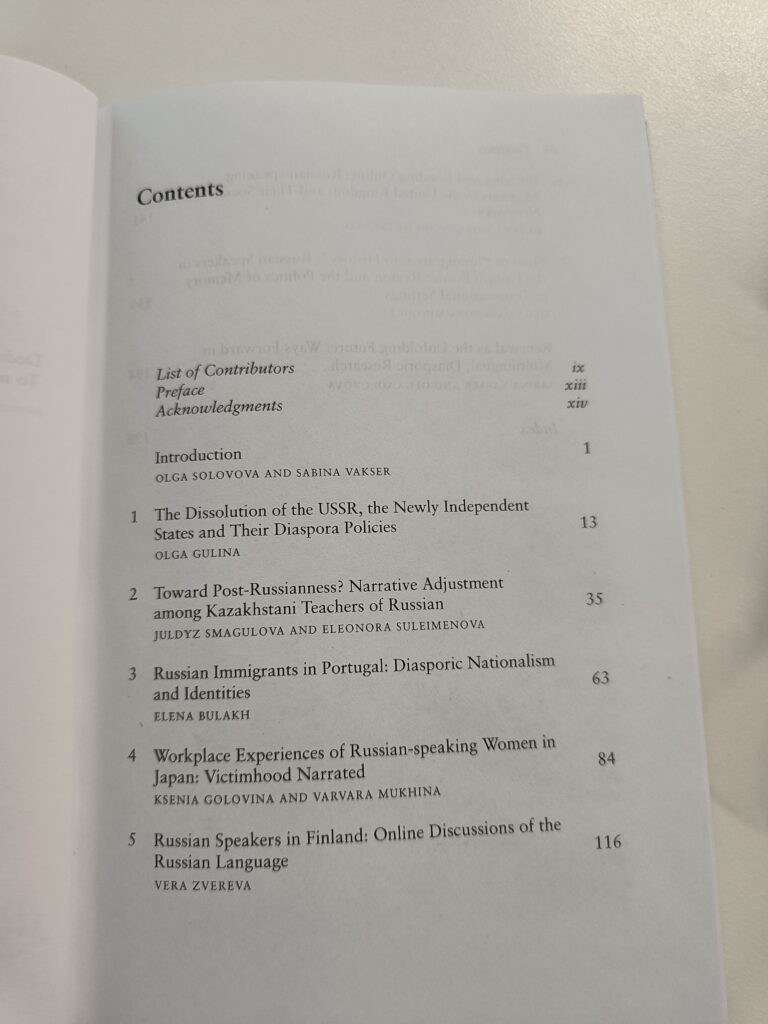
It includes the chapter by Vera Zvereva on Russian Speakers in Finland. The chapter provides a qualitative analysis of user communication in posts and comments in two Facebook communities of Russian speakers in Finland and explores users’ attitudes to ‘accuracy’ in using the Russian language. It examines what meanings the group members assign to the grammatical and orthographic ‘correctness’ of the language in which they communicate; the situations in which ‘accuracy’ becomes significant; and how these issues relate to discursive performance of the cultural identity by these Russian speakers in Finland. ‘Correct’ use of Russian has different symbolic values in each overlapping context in which members of these groups are communicating, i.e., Finland, the country in which they have now settled; the Russian digital diaspora; and their specific online group. The intersection of these contexts creates tensions for members of these online groups. Different understandings of the value of ‘correct’ use of the Russian language coexist and sometimes collide. In some situations, the participants interpret Russian as a language of intercultural communication, where ‘accuracy’ is subordinate to its utility for solving practical problems. However, ‘accuracy’ in using the language is often endowed with various symbolic meanings associated with Russian-speaking migrants’ cultural identity and is instrumental in constructing power relations in the community.
2023.12.01. A paper presented by Vera Zvereva on How Russian ‘patriotic’ social media foster emotional investment in the war in Ukraine at the Annual convention of Association for Slavic, East European and Eurasian Studies (Philadelphia Marriott Downtown, USA).
Vera presented how among Russian ‘patriotic’ media, Telegram and YouTube have been increasingly influential in covering the war in Ukraine and promoting key messages in support of the Russian authorities. Besides the already-existing propagandists and pro-Kremlin bloggers, trolls and bots, among the most important new actors are the ‘voenkory’ or war correspondents. This paper uses critical discourse analysis and theoretical studies of ‘emotional’ social media used in right-wing populist politics (Jasper, J. M. 2011; Papacharissi, Z., 2015; Wahl-Jorgensen K., 2016, 2019; Wodak R. 2014, 2021; et al.) to examine how the ‘voenkory’ channels on YouTube and Telegram promote the war as necessary, foster emotional engagement in it, and employ emotion and affect in discussing it. Their three main propaganda themes – the role of NATO and the West as instigators in a proxy war against Russia, the need for Russians to rally around the Russian president, and the dehumanization of Ukrainians – are shown to be embedded in the correspondents’ immersive narrative of military events.
2023.10.05. A Presentation by Tatiana Romashko on “Consolidating the Nation in Putin’s Cultural Front” at the International Cultural Policy Conference and the 6th General Assembly of the Compendium Association in Valletta, Malta Hosted by the Arts Council Malta.
Combining insights from cultural policy and Russian politics, Tatiana’s talk explored the emergence and impact of the ‘cultural front’ in Putin’s Russia.
Founded in November 2022, the ‘cultural front’ in Putin’s Russia was a response to the urgent needs of the state in the midst of the ‘special military operation’ in Ukraine. Tatiana argued that this public movement serves a dual purpose.
First, it seeks to mobilize Russians in support of the war by disseminating Kremlin narratives through everyday discursive practices. Second, as an expert platform, it implements presidential decrees on state cultural policy, monitors budgets, and promotes cooperation across socio-cultural, educational, religious, and military spheres. In my current research, Tatiana points out that the ‘cultural front’ movement is poised to function as an additional political mechanism, mobilising grassroots efforts to align cultural production with Kremlin priorities, while reporting on dissenting voices.
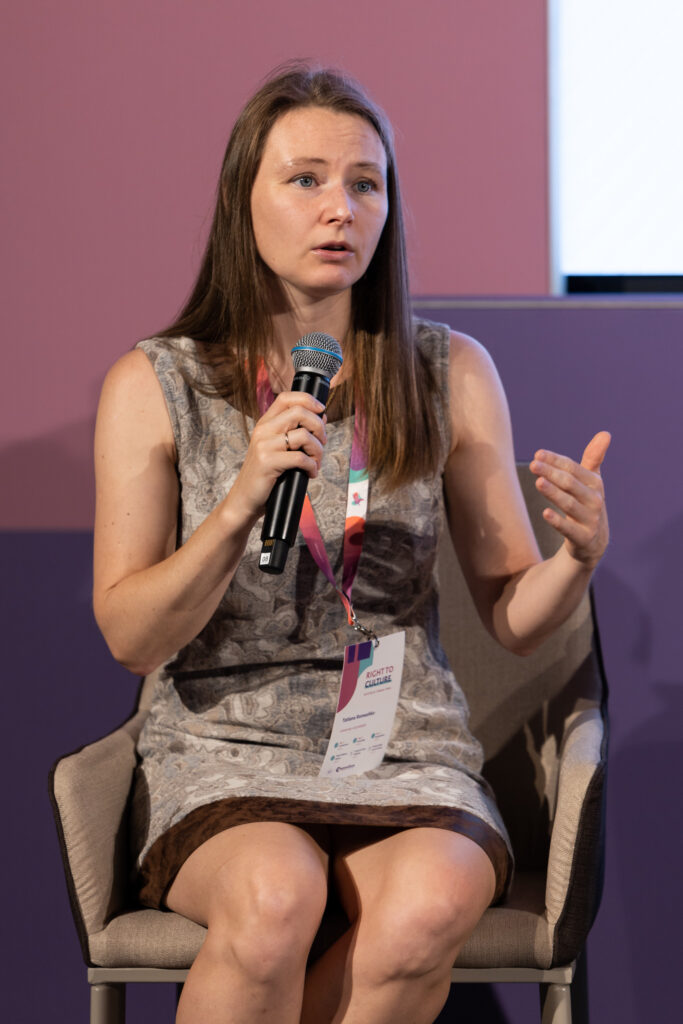
2023.09.28. A Panel discussion by Tatiana Romashko on how to Understand Russian society amid the war of aggression in Ukraine at the Annual CSSR (Center for Security and Strategic Research Latvian National Defence Academy) conference (Radisson Blu Latvija Conference & Spa Hotel, Elizabetes iela 55, Conference Hall Beta 2).
The discussion primarily dealt with the ongoing war in Ukraine and its implications for Russia – its military and society. Tatiana wrote a blog post about the conference, which is available here: Why study Russian society? And why now?
2023.08.22-23. A Lecture “Visual Biopolitics: How to Read Pro- and Anti-War Sentiments in Russia” by Tatiana Romashko at VIExpert Summer School at Lammi Biological Station (Pääjärventie 320, 16900 Lammi).
A Summer School lecture explored the fascinating intersection of visual biopolitics and post-structuralist discourse theory in the context of Russia’s ‘special operation’ in Ukraine. The aim of the talk was to introduce a new way of understanding the complexity of social sentiments in Russia in relation to the ongoing conflict in Ukraine. We explored the concept of ‘Z-tification’, which refers to the mass displays of support for the actions of the Russian government, often seen in activities such as Z-flashmobs. It also analyzed the political impact of street art and symbolic creativity in challenging official hegemony and expressing dissent. The lecture provided participants with valuable analytical tools for studying both pro- and anti-war sentiments in Russia. We examined visual examples of these sentiments and discussed methods of interpreting the material, taking into account its social and political characteristics. The session was characterised by lively discussion and the exchange of innovative ideas. This lecture at the ExpREES Summer School 2023 was an opportunity to shed light on the role of visual culture in shaping public opinion and resistance in Russia, a topic that remains highly relevant in the current global landscape.
2023.05.11. Presentation by Tatiana Romashko on the “Construction of the Cultural Front in Putin’s Russia: a case study from cultural legislation amendments” at The Annual Conference of the Finnish Political Science Association, 10-12 May, University of Jyväskylä (Seminaarinkatu 15)
Tatiana’s presentation examined changes in Russian cultural policy against the backdrop of the ongoing war in Ukraine. She argued that recent amendments to the Foundations of Russian State Cultural Policy, signed by Putin in January 2023, reflect an acceleration of the Russian government’s attempts to use the cultural sphere to unite the population and gain support for the war effort. Through an analysis of the legal changes and their implications for the cultural sector in Russia, Tatiana explored the political problem of cultural policy as formulated by Russia’s political leadership and examined the representation of the two protagonists of the cultural struggle. The research presented during the conference revealed the characteristics of the ‘cultural front’, namely the depoliticisation of those in power and the dehumanisation of those perceived as traitors, opposition and dissenters. It also shed light on the nature of the ‘cultural front’ that Putin is attempting to create and maintain, including its characteristics of weaponising national memory and history to gain support for the war effort.
2023.04.02. Presentation by Vera Zvereva on the Discussions about Russian language and culture in Finland’ at the Annual conference of the British Association for Slavonic and East European Studies (University of Glasgow, United Kingdom)
In the context of Russia’s aggression against Ukraine, many questions have arisen in European countries regarding the “Russian” language and culture. On one hand, the significance of how to address the Russian language and culture diminishes amidst ongoing conflict, where lives are lost daily, and Ukrainian cities and cultural heritage face destruction. While important, this issue remains secondary compared to efforts to support and aid the Ukrainian side. Moreover, as long as the war persists, resolutions regarding the Russian language and culture remain elusive. On the other hand, this matter holds importance for European countries and cannot be deferred until the cessation of hostilities. When discussing attitudes toward the “Russian language and Russian culture,” it is essential to recognize that this extends beyond attitudes toward the Russian authorities or Russia as an aggressor, or toward Russian emigration. It encompasses questions concerning language and identity for a segment of the population, many of whom are citizens of European countries. In her talk, Vera raises a question – what does this issue entail from Finland’s perspective?
2023.03.23. Presentation by Rasa Žakevičiūtė on “Cultural agency as a means of resisting political labelling. A case of Russians in Finland” at The Annual Sociological Conference 2023, 23-24 March, University of Tampere (Kanslerinrinne 1)
In her presentation, Rasa was discussing how the Russian invasion of Ukraine in 2022 has created new conditions in which Russian communities started experiencing political labelling. It led to restrictions (e.g. the travel ban on Russian passport holders to the Schengen area), boycotts (e.g. of Russian products, Russian consumers, Russian athletes) and calls for the cancellation of Russian culture (e.g. the ban on Russian artists and the “Cancel Russia” movement). Political labelling is also felt from Russia that tries to diasporize Russian speaking communities by stressing boundlessness of the Russian World and treating all the people who speak and think in Russian as the subjects of the Russian civilization and therefore as compatriots of the Russian Federation. These trends have forced many Russian speakers abroad to (re)consider their own identities, political positions and alliances. and the attempts of Russians in Finland to resist increasingly negative political labelling by reinventing their cultural agency, which is autonomous from the Kremlin’s narrative of the Russian World.
2023.03.09. Participation in the “Yle – Public Service 100 Years: Mediating Culture and Imagining Finland” Seminar, (Porthania 3, University of Helsinki)
Tatiana Romashko participated in Yle’s open seminar “Mediating Culture and Imagining Finland” in Helsinki. At the seminar, researchers from various Finnish universities presented their perspectives on the 100-year history of the Finnish Broadcasting Corporation. One of the presentations described the research project “Mission Finland: Cold War Cultural Diplomacy at the Crossroads of East and West”, under the leadership of Dr. Pia Koivunen (https://missionfinland.utu.fi/en/). This Tampere-based research team aims to examine a range of cultural and information activities of various countries, including the Soviet Union, in Finland. It is very relevant to our research, as the described study is looking at the same issues of Russian cultural diplomacy in Finland, but in the past. It was also useful to hear about the contingency plan they have when there is not much information available from Russia, and about Russian cultural projects in Finland. The received knowledge was very important for our ongoing research, while the newly acquired contacts might lead to the future cooperation with Tampere University research team.
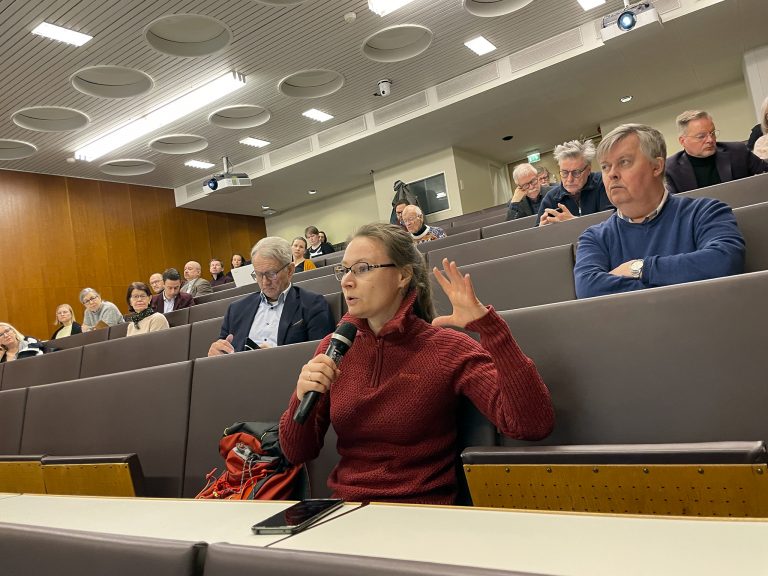
2023.02.08. Out now: Tatiana Romashko (2023) Russia’s cultural policy abroad as a projection of the “Russian World”, Cultural Trends, DOI: 10.1080/09548963.2023.2171771
Tatiana’s policy review provides a brief discussion of the ‘Russian World’ concept and its path to the Russian humanitarian policy abroad, focusing on its political implications and the role it plays in Russia’s international relations.
Link to an article https://www.tandfonline.com/eprint/YQKQ2R9BNYDVUF52NAC4/full?target=10.1080/09548963.2023.2171771
For more on the topic, read Tatiana’s blog entry on ‘Russian World’
2023.01.31. Presentation by Vera Zvereva on Russian ‘patriotic’ social media in the Russia’s information operations and disinformation seminar. University of Tampere, Paidia, Nokia Areena (Kansikatu 3)
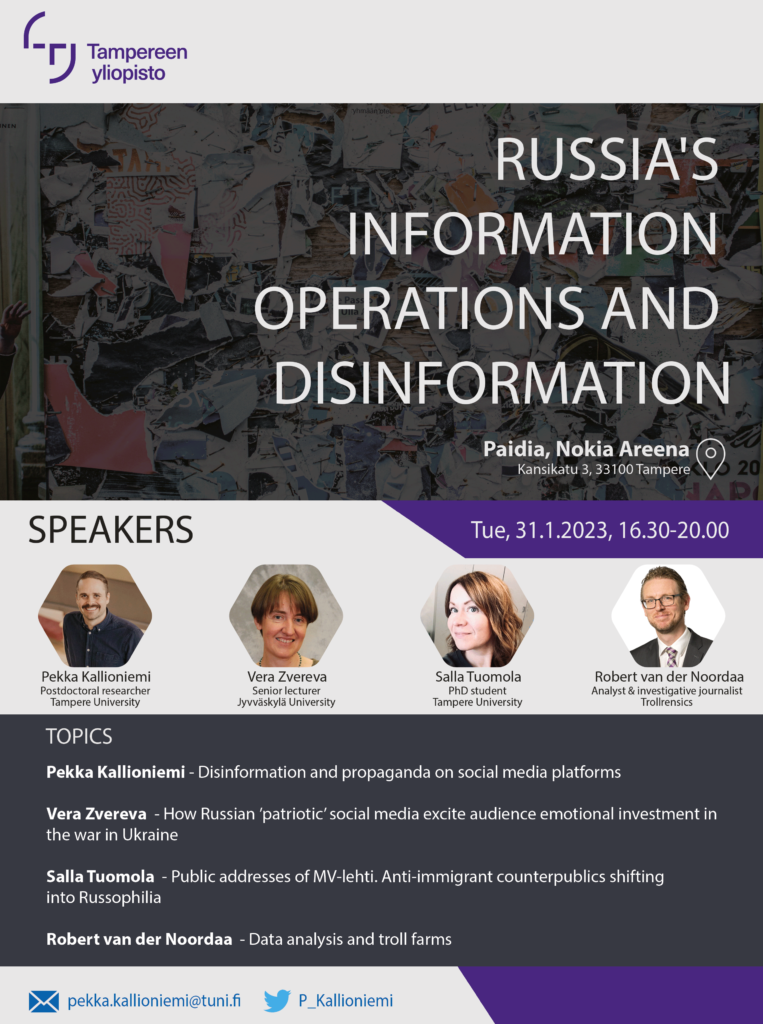
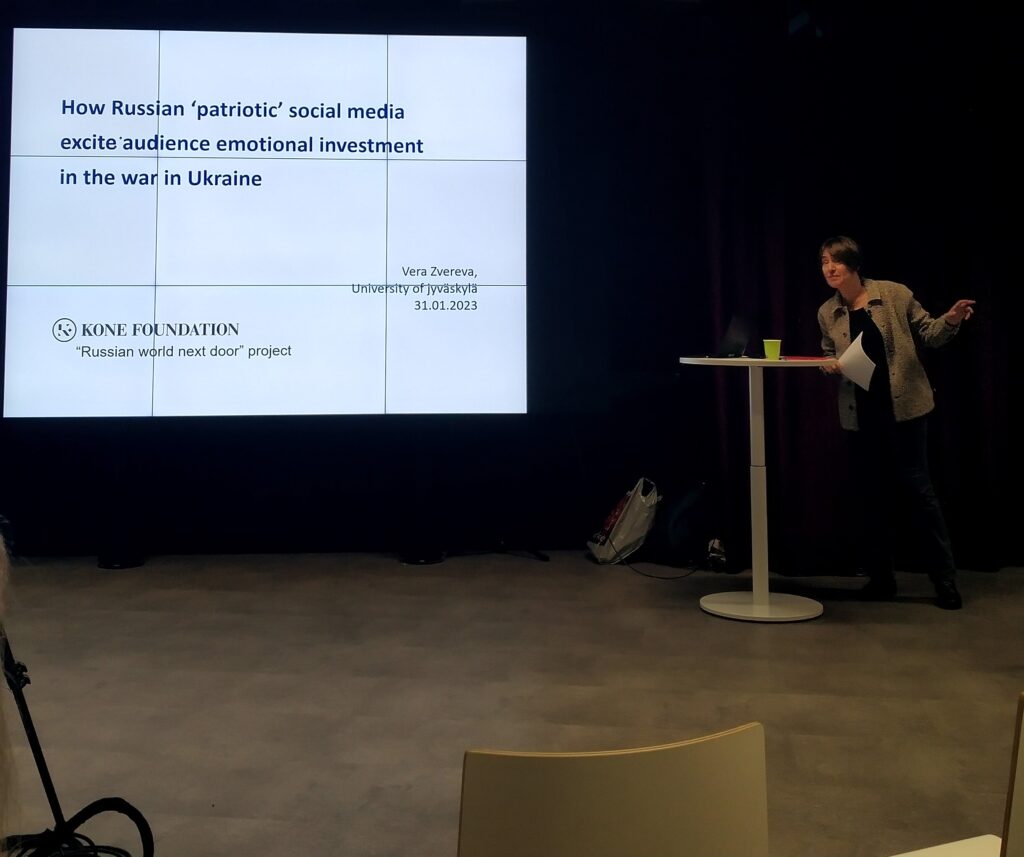
In her presentation, Vera talked about Russian propaganda on the ‘patriotic’ social media channels (Telegram) and their deliberate affect on the emotions of the readers. The immersive narrative that is created in Kremlin sponsored posts dehumanises the Ukrainian fighters and emotionally stirs the readers to support the Russian ‘defenders’.
2022.10.07. CEURUS podcast on Russian cultural policy. Fidan Valin’s interview with Tatiana Romaskho (in Russian), Centre for Eurasian and Russian Studies – CEURUS, University of Tartu
In this interview, Fidan and Tatiana talked about the importance of culture and cultural policy in the Russian legislation. The discussion touched upon the topics of cultural policy as extension of geopolitics; the principles of Russian cultural policy; ideology of the “Russian world”; the attitudes towards Russian soft power; cancellation of Russian culture; and other related topics. The interview (#33) was conducted in Russian and can be accessed through the CEURUS podcast page, Spotify, or Google Podcasts.
2022.09.22. Presentation by Tatiana Romashko on ‘‘Experts’ and ‘marginals’ of cultural policymaking in Putin’s Russia’ at the 12th International Conference on Cultural Policy Research. 19 – 23 September 2022, University of Antwerp (M- building, Sint Jacobsstraat 2), The Netherlands
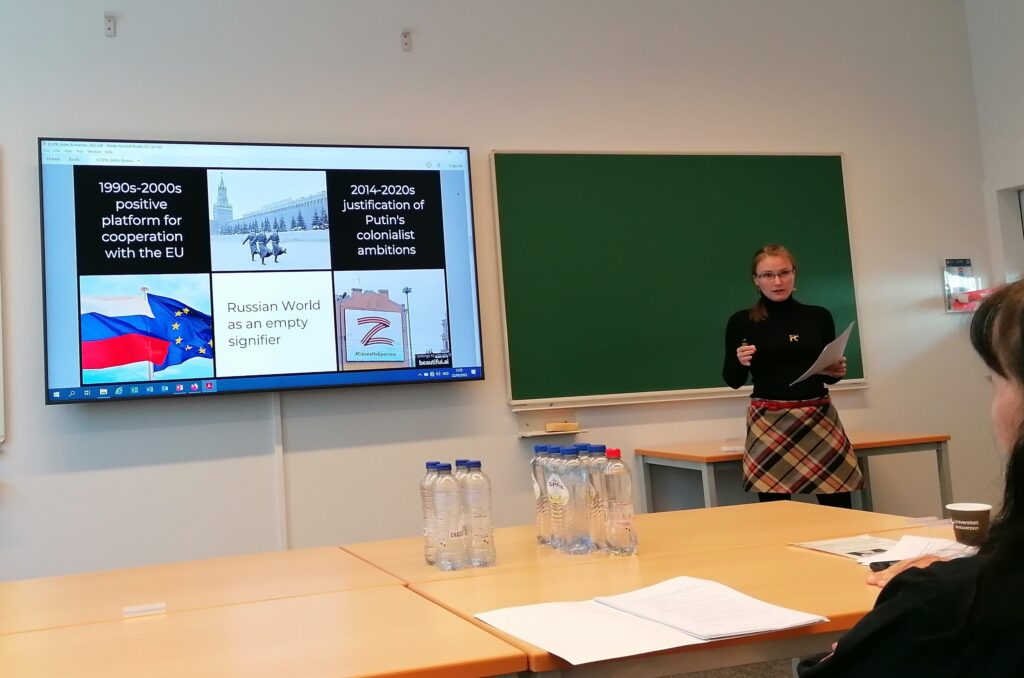
In her paper, Tatiana addresses a conservative turn in the recent evolution of state cultural policy in Putin’s Russia. In particular, she examines the Kremlin’s meaningful system of the ‘Russian World’ as a prevailing discourse of cultural securitisation against the Western Other. In cultural policy, she argues, the ‘Russian World’ imaginary operates as ‘authoritative discourse’ (Bakhtin 1975) that steers the policy development and conditions its politically constructed problems as true and necessary. Expert opinions become marginalized when they attempt to challenge the dogma behind authoritative discourse. To show this, she examines the scope of the political debate over the new legislative initiative of the Presidential Administration – the Federal Law on Culture in the Russian Federation, focusing on the actors of policymaking, their characteristics and forms of participation. The study is based on an analysis of the transcripts of meetings of the Presidential Council for Culture and Art and the National Security Council, the State Duma, the Public Chamber, as well as expert meetings and public forums. Data obtained from open sources of information for the period from 2019 to 2022
2022.09.13. Project kick-off workshop. Online talk was organised by the collaborative initiative between Russian Media Lab Network, University of Helsinki, and Tampere Research Center for Russian and Chinese Media.
The project was presented by Vera Zvereva, Tatiana Romashko and Rasa Žakevičiūtė where we talked about the objectives of the study and the original goals of the project, and how we were affected by the Russian invasion of Ukraine in February 2022. Since the Russian invasion of Ukraine, political situation has been changing rapidly. There is a significant reduction in the space of “Russian cultural diplomacy” in Finland. Internet sources that supported the activity of Russian pro-state organizations in Finland are disappearing, and the reluctance of our potential respondents to talk about topics related to Russia, Russian culture or Russian-Finnish cooperation is growing. During the Online talk, we discussed new ways of collecting data and possible research methods, received critical comments and suggestions from the audience on our plan, and thought together about possible ways of collaborating with interested researchers.
2022.07.01. Presentation by Vera Zvereva on ‘Communication Strategies of Russian Diplomacy on Social Media: the Use of Impoliteness’ at the 2nd International Conference on Language in the Human-Machine Era. University of Jyväskylä, University Library Lähde (Seminaarinkatu 15).
In her presentation, Vera focused on the use of digital technologies by top Russian diplomats communicating with both international and domestic audiences on social media. She examined the communicative strategies of Russian diplomats that impart meaning to political events, construct power relations and build ingroups and outgroups. In particular, she explored the instrumentalization of impoliteness in addressing the Internet audience as well as the emergence of the figure of the diplomat as a digital media influencer and celebrity. How is impoliteness used in diplomatic discourse in social media? And how does impoliteness in diplomatic discourse help shape an aggressive and confrontational emotional regime for the social media audience? To answer these research questions, she used the theoretical framework of critical discourse analysis and conceptual tools of impoliteness theory. She interpreted impoliteness in Russian diplomats’ social media discourse by reference to two contexts. These are, firstly, the transformation of political language as part of the global rise of digitally mediated political populism; and secondly, the Russian political situation in the 2010-20s. For this study, Vera chose two channels of diplomatic communication in social networks: the official Twitter of the Ministry of Foreign Affairs of the Russian Federation and the personal Facebook account of its official representative, the Director of the Ministry’s Information and Press Department, Mariia Zakharova. This study was carried out before the start of the war in Ukraine. We believe that the phenomenon described in the presentation – the shift towards impolite and aggressive communication of diplomats in social networks – communication using populist techniques and designed for a home audience – was one of the means that paved the way for war and served to legitimize it.
2022.06.23. Presentation by Tatiana Romashko at the CEEISA 2022 Convention on Self-marginalisation and Politics in today’s Russian Cultural Policy. University of Economics, Bratislava, Slovakia.
Tatiana addressed the Kremlin’s meaningful system of the ‘Russian World’ as a particular niche of Russia’s soft power abroad and a prevailing discourse of self-representation – cultural securitisation against the Western Other. Within this discourse formation, Russia’s ‘sovereign democracy’ (Surkov 2006) is politically linked to national culture, welfare policies, and state intervention in the life of the Russian population and foreign countries. Tatiana showed how these conservative ideas are normalized through the moral and intellectual leadership of the Presidential Apparatuses that concentrates sovereignty over the decision-making process. Nevertheless, she argued that the policymaking process unfolds through power techniques associated with the Foucauldian (2008) notion of governmentality. To show that, she explored the processes of ‘knowledge production’ (Foucault 1982) within Russia’s take on cultural, national, and security policies, which, to a certain extent, might be characterised as the ‘politics of the theoretical statement’ (Bhabha 2007). To support her argument, she examined various logics (i.e., problematisation, subject positions, and objects) of the policy debates and the hegemonic forms of ‘subordination, domination, and oppression’ (Laclau, Mouffe 2001: 154) of ‘expert’ community of state governance. Research is based on analysis of transcripts of Presidential Councils and the Russian Parliament.
2022.05.20. Seminar at the department of History and Ethnology’s research cluster “Crisis and Societal Change”. Discussion on Putin’s media, Russian propaganda and the Ukrainian War from a Russian perspective. University of Jyväskylä, room H320 (Seminaarinkatu 15)
2022.04.14. Participation in the virtual DiscourseNet ad-hoc workshop ‘Discourses of War and Peace: Reflections on and around the Aggression against Ukraine’. Presentation by Tatiana Romahko on The Russian World imaginary: transmitting supremacy through language and culture.
Tatiana was addressing the “Russian world” imaginary and its role in the justification of the war in Ukraine. In her talk, she was answering such questions like: How does Russian state cultural policy contribute to the “Russian world” imaginary? What is the ‘mission of culture’ in constructing and maintaining the Russian world and its subjects? Tatiana’s presentation slides can be found here.
2022.03.17. Open public lecture by Vera Zvereva about the war in Ukraine, Russian propaganda and discourses of war in Russian media. University of Jyväskylä in A-building, room A012 (Seminaarinkatu 15)
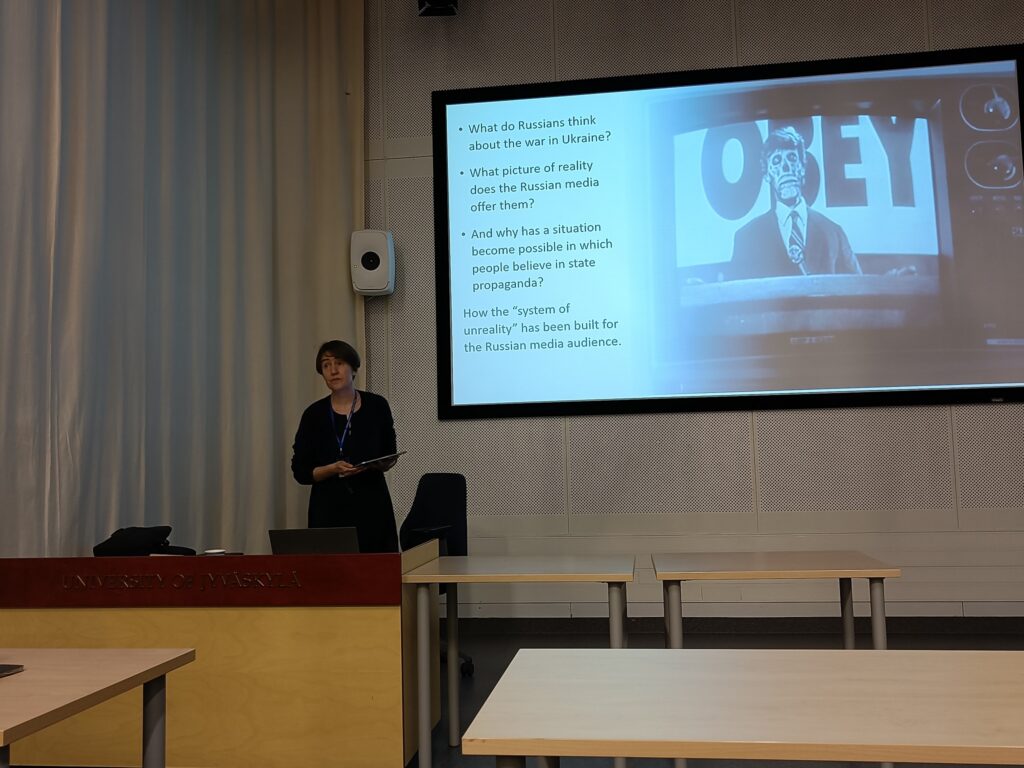
Vera introduced how the media propaganda system works in Russia and discussed most relevant questions that are arising in the light of the current conflict. What do ordinary Russians know about the war in Ukraine? What picture of reality does the Russian media offer them? Why in the 21st century has a situation become possible in which people believe in state propaganda; how does the information blockade work in Russia, and how does it affect public opinion?
2022.03.01. Initiation of the project with the first meeting of the three participating researchers. Discussion on the methodology, initial project plan and the impact of the Russian attack on Ukraine on the progress of the project.
